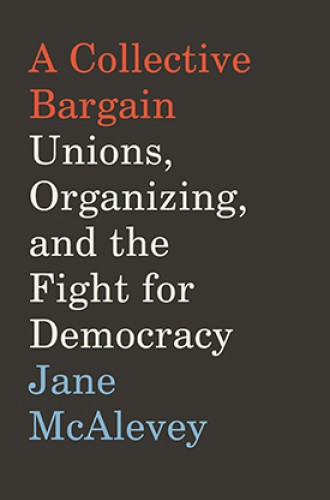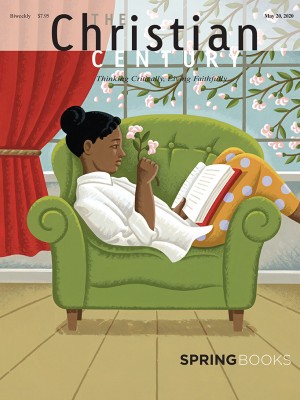Redistributing power—one labor victory at a time
Jane McAlevey’s survey of labor unions shows that organizing and strikes still work.
Almost overnight during the COVID-19 pandemic, people formerly called unskilled laborers became essential workers. Most of them are among the large group of Americans who have no substantial savings or are in debt. In other words, the people who have the least choice about continuing to go to work despite the risks are the ones sustaining our economy. Facing this reality requires solidarity: working together beyond groups of like-minded people.
Solidarity is essential for democracy, Jane McAlevey argues, and labor unions are one of the best tools we have to build it. Unions have long been a counterbalance against polarizing forces, McAlevey writes. But hand-wringing about white workers “voting against their interests” misses the point, since many Democrats have worked to dismantle unions as ardently as Republicans. The polarization that unions work to undermine stems from economic inequality.
Read our latest issue or browse back issues.
Corporate executives and investors not only have the money that could be in US households’ savings accounts, but they have also amassed the political influence the middle class and working class could have through unions. I’ve seen glimpses of this influence in the Chicago Teachers Union, which is truly democratic in the sense of collective decision making and leaders who act on the will of the members. They continually push back against austerity measures that gut funding for public goods and give tax breaks to the richest.
This illustrates an essential point in McAlevey’s analysis: unions not only redistribute wealth, they redistribute power. We know this, she writes, because corporate executives have fought so hard to destroy them.
McAlevey surveys labor history from 1935 to 1947, a period when organized labor won victories that looked impossible until they were won. While some of the rights those victories procured were rolled back at the end of those 12 years, others remain active today. Prior to collective action creating unions such as the United Auto Workers, McAlevey notes, “conditions in auto plants essentially weren’t different from the abysmal ones in today’s average Amazon warehouse.”
Many textbooks include this history in some form. They don’t include what McAlevey details about the way the Koch brothers and other right-wing billionaires funded a legal strategy to eviscerate workers’ rights. Several lower court cases recently culminated in US Supreme Court rulings that limit the ability of unionized and nonunion employees to work together to address employment conditions.
But unlike many others, McAlevey doesn’t see this as a death blow to organized labor. Organizing and strikes still work. McAlevey interviews organizers and workers who participated in several major labor victories in the past three years. In case it might be lost on any readers, she emphasizes that these gains took place despite the Supreme Court decisions and during the Trump administration.
For example, from 2017 to 2019, women led strikes and collective bargaining in their workplaces that won protections against sexual harassment by hotel guests and racial discrimination in hospital salaries. McAlevey writes, “When it comes to forcing the top executives to rethink their pay, benefits, or other policies, there’s no form of regulation more powerful than a serious strike.” She compares strikes to a muscle, strengthened with exercise.
Drawing on her experience as a union organizer and strategist, McAlevey details how campaigns identify natural leaders in a workplace, fight misconceptions spread by union-busting consultants, and continue to work for policy changes beyond the union election. Union campaigns prove that it’s possible to work together across differences that could otherwise become divides.
One crucial aspect of union organizing is the conviction that 51 percent is not enough. McAlevey believes that get-out-the-vote efforts and political campaigns should operate on this same principle. Voter suppression, like antiunion efforts in workplaces, are a reality that has to be taken into account. And it’s necessary to keep engaging people who are initially skeptical or opposed. She writes: “Besides winning an election, learning to build supermajorities has another crucial benefit: it builds governing power.” People who are accustomed to having decisions handed down to them become part of the process of negotiating and hashing out decisions.
McAlevey offers plentiful data showing how unions lift—and keep—people out of poverty and the need to work multiple jobs. She cites a report from 2019 from the world’s largest hedge fund, stating that the main reason corporate profits have increased in the past 20 years is that workers are getting paid less. McAlevey quotes from this report: “While changes in union activity have been smaller in recent years, even small moves toward or away from unionization can be linked to changes in how much firms pay their employees.”
A graph shows union membership rates falling in recent decades and the middle-class share of income in the United States falling right along with them. In contrast, McAlevey gives the example of Sweden, where high unionization rates coincide with policies such as paid parental leave time.
A crucial aspect of A Collective Bargain is its effort to wake up workers across various levels of education and privilege. McAlevey writes at length about abuses in the tech industry. Every employee can be subject to unfair treatment, she emphasizes. Bosses don’t have to be malicious or greedy to act with insensitivity to the effects of their policies on employees and the families who depend on them.
Surprisingly, though, McAlevey doesn’t devote much discussion to immigrant workers, who make up much of the working class today. She might have included a discussion of the interrelation of immigration law and labor law, given the particular vulnerabilities of immigrant and undocumented workers.
McAlevey acknowledges the shortcomings of unions. But she makes the case that despite their problems, there’s no other institution that can play the same role. She writes, “Some unions do live up to the pejorative labels given to them by corporate media, but most do not. People are flawed, and unions are made up of people. . . . Unions, then, are far from monolithic.”
Here McAlevey sounds almost like a church leader responding to detractors of organized religion. I’m married to a union-side labor lawyer, and I’ve gotten to know many unions and labor leaders. Each criticism I’ve heard of unions—legitimate or not, in any particular case—is one I’ve also heard of churches. They can be greedy, corrupt, or self-interested. They don’t always live in the real world. They don’t always meet the needs of today.
I’ve also seen the way unions bring people together to advocate for the most vulnerable. Twice in the past year I’ve joined my congregants on the picket line. In one large hospital system, I stood by nurses as they went on strike for safer conditions for themselves and their patients. Some of those same nurses are now caring for people who have COVID-19.







